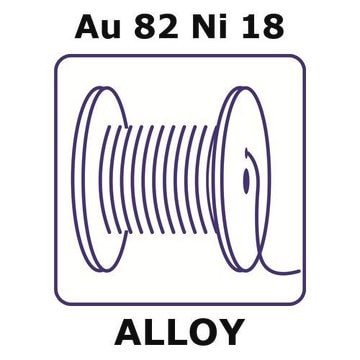GF89678570
Nickel
wire reel, 100m, diameter 0.025mm, as drawn, 99.98%
Synonym(s):
Nickel, NI005106
About This Item
Recommended Products
Assay
≥99.98%
form
wire
manufacturer/tradename
Goodfellow 896-785-70
resistivity
6.97 μΩ-cm, 20°C
bp
2732 °C (lit.)
mp
1453 °C (lit.)
density
8.9 g/mL at 25 °C (lit.)
SMILES string
[Ni]
InChI
1S/Ni
InChI key
PXHVJJICTQNCMI-UHFFFAOYSA-N
General description
Legal Information
Signal Word
Danger
Hazard Statements
Precautionary Statements
Hazard Classifications
Carc. 2 - Skin Sens. 1 - STOT RE 1
Storage Class Code
6.1D - Non-combustible acute toxic Cat.3 / toxic hazardous materials or hazardous materials causing chronic effects
WGK
WGK 1
Flash Point(F)
Not applicable
Flash Point(C)
Not applicable
Choose from one of the most recent versions:
Certificates of Analysis (COA)
Sorry, we don't have COAs for this product available online at this time.
If you need assistance, please contact Customer Support.
Already Own This Product?
Find documentation for the products that you have recently purchased in the Document Library.
Our team of scientists has experience in all areas of research including Life Science, Material Science, Chemical Synthesis, Chromatography, Analytical and many others.
Contact Technical Service




